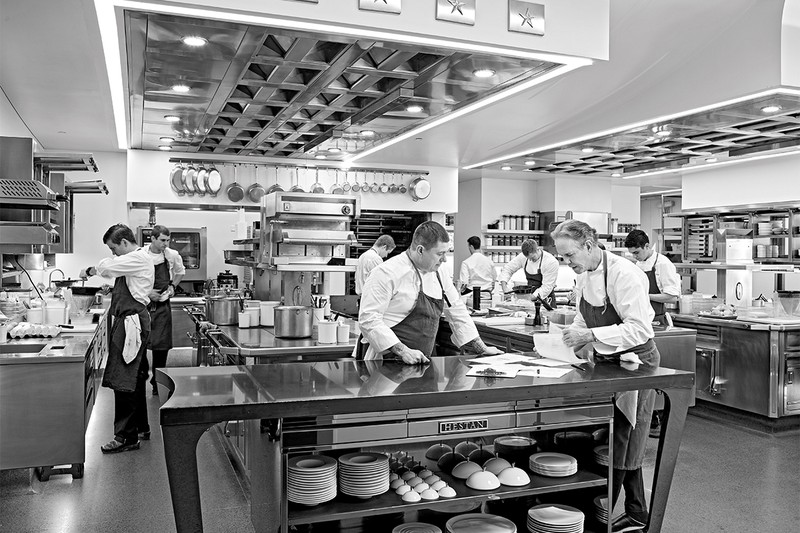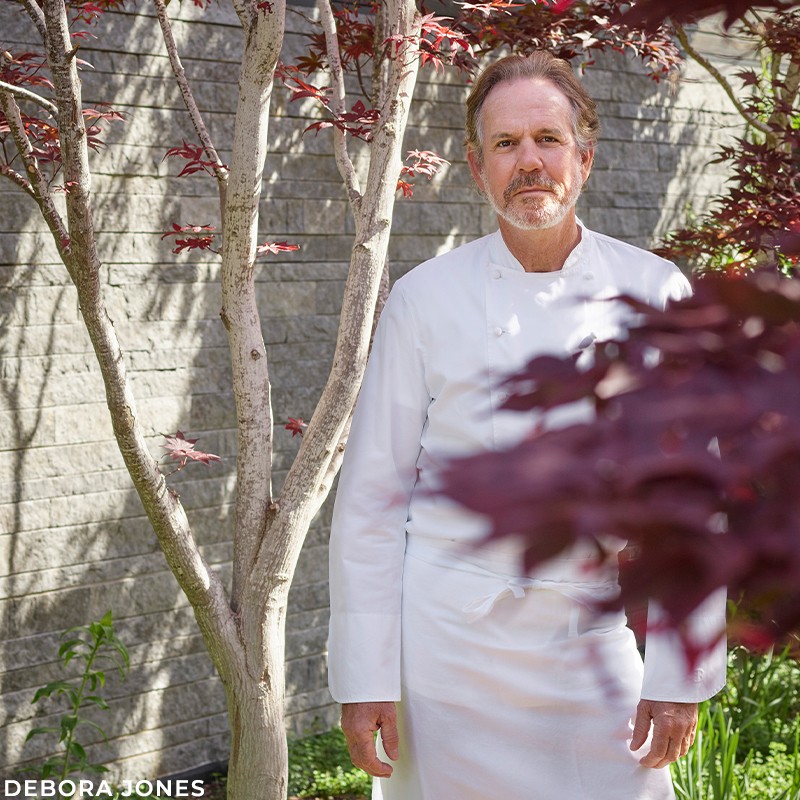What It’s Like At The Top
Love your work. In my business, we get to do so many things every day that most professionals don’t really get to do. We get to invite a lot of people into our restaurants and give them a wonderful experience. We basically throw a party every night. People who come to the restaurants are often celebrating and that’s what we help them do.
Work with great people. The farmers, the fishermen and the gardeners we work with deliver some of the best ingredients available. We get to support them and their families. Then there are the teams in our kitchens, our dining rooms and our wine departments. We bring them in, train them, mentor them, watch them, help them, encourage them to get better at what they do. One of our suppliers, Brent Wolfe, has been supplying our quail for 26 years. I was talking to our young sous chef recently and he was saying how he happy he is that he gets to speak to Brent Wolfe every week – Brent’s been part of what we do for so many years he’s become an icon! That’s just our quail farmer. Think of the hundreds of people we deal with for all of the ingredients our restaurants need. We appreciate everything they do for us.
Don’t think about the accolades. Winning them is not what we set out to do. We set out to establish a work environment where we could all excel. Everyone working at the restaurants is thinking about how we can be better than the day before. We're not trying to do work that somebody else wants us to do; we're trying to do the work that we want to do. That's important. The accolades come – or don’t come – based on our ability to do that. The Michelin stars are a great honour and an enormous responsibility, but the best way we can respect Michelin’s tradition and its decision to bestow us with three stars is to excel every day.
Collaboration is crucial. We change the menu at The French Laundry every day and have done since it opened in 1994. That happened by accident: on the second day we were open, the four of us working in the kitchen just wrote the menu together. Nobody was really the chef de cuisine; we all had the opportunity to influence the menu. That has continued to this day and is now a cornerstone of the restaurant simply because the four of us enjoyed it. Collaboration has allowed us to do so much. We’re not a seasonal restaurant that changes its menus four times a year; we have an opportunity to change them and to evolve ourselves every single day.
Prepare to evolve quickly. No one has opened a restaurant in the way we opened Per Se. We closed down the French Laundry and took the people that worked there to New York. They helped to inculcate 100 more people with our philosophy, our culture, our vocabulary, our ideas and our repertoire. I was criticised at the time for stretching myself too thinly but what we were really doing was making ourselves twice as strong. Per Se was not an infant when it opened; it was a sister to the French Laundry. We didn’t just have the ideas going back and forth; we had our people going back and forth. So many people have gone back and forth between these two restaurants. It’s given us a culture that I don’t think exists anywhere else.

The next generation is the most important one. For example, my name is on the new book but I’ve had the smallest contribution to it. The most important people in this book are the current chefs at the French Laundry and Per Se, David Breeden and Corey Chow. The idea is you pass on the baton – it’s about the next generation standing on the shoulders of those who came before them. The great French chef Paul Bocuse influenced me and showed us all the importance of teaching. I interpreted what he gave me and now I give that to the next generation. Then it’s the responsibility of David and Corey to pass it on to a younger generation. They must give everything they have to them, so that the next generation becomes better – in the same way Corey and David are better than me. That’s the only way that excellence can endure.
Mentoring matters. To be a good mentor, I think you have to be aware: to really see and hear and understand where people need help. Then it’s about being able to influence that person in subtle ways so they can become better in what they do. Mentoring doesn’t really happen when you’re sitting down. There are meetings, of course, but it’s actually while your mentee is working that you can just offer a different perspective, give them a grain of knowledge that can sprout in them and they can develop from there.
Ask for help along the way. I had many mentors, starting with my mother. She helped me in so many different ways, then my older brother was in the culinary profession and he taught me how to make hollandaise sauce first. Roland Henin, the French chef I worked for in the 70s, asked me why cooks cook. He showed me we cook to nurture people, and that’s the day I decided to become a professional chef. That’s the kind of mentorship that is profound: he realised something in me and asked me that question.
The cooking itself is easy. Just look at the book. Roasting, braising, grilling, boiling, poaching – these are techniques that have been there for hundreds of years and they are the same ones we employ. The recipes haven’t been modified for different skill levels, so they capture the time and place they were written for the restaurants. If you’re a novice cook, you can learn how to pickle a vegetable, but there are also points of learning anybody can take from them – little techniques to enhance flavour, for example.
My favourite recipe in the book might be the tempura-fried soft shell crab. It’s one of Corey’s that’s inspired by sustainability – leftover carrot peelings are infused into a carrot oil – and by Chinese culture. I had my first experience with a soft shell crab when I was 12 at my uncle’s tavern in Maryland, where the soft shell crabs are famous. That’s fascinating to me: different generations, different backgrounds, but Corey and I both love soft shell crab.
Or it might be the steak and potatoes. It updates the Yabba Dabba Do dish we created at The French Laundry. At the time we were doing lots of dishes in 60-70g portions; I wanted to do something for sharing, so I did a cote de boeuf. I was inspired by The Flintstones; now David is building on that dish from his own experience of enjoying green goddess salad dressing at his dad’s favourite restaurant in the 70s. It harks back to something simple, but it captures the sense of evolution that makes our restaurants special.
I hope to break 80 sometime soon on the golf course. Professionally, though, I don’t think there’s anything else I want or desire. I’ve been blessed. Twenty or 30 years ago, I would never have contemplated getting to this point. I’m just really happy when I walk into my restaurant; I see younger generations of highly trained professionals, men and women from all cultural and ethnic backgrounds, and I’m proud they have this opportunity to work together, progress and improve, and give our guests a wonderful experience.
Buy The French Laundry, Per Se by Thomas Keller here. For more about the restaurants, visit ThomasKeller.com
DISCLAIMER: We endeavour to always credit the correct original source of every image we use. If you think a credit may be incorrect, please contact us at [email protected].


